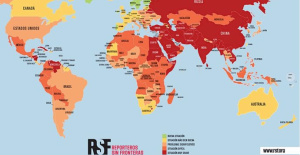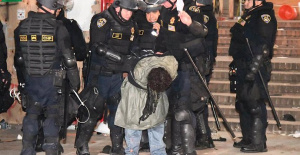MADRID, 4 Sep. (EUROPA PRESS) -
The Supreme Court faces this new judicial year with a reduced staff due to the impossibility of the General Council of the Judiciary (CGPJ) to make new appointments. And it does so pending the publication of the ruling on the case of the ERE of Andalusia, and to rule on the appeals presented by Ciudadanos, Vox and PP --among others-- against the pardons of the leaders of the pro-independence 'procés' in Catalonia .
In a course start very similar to that of 2021, in the Supreme they suffer, if possible even more, the consequences of the political blockade in the renewal of the CGPJ. It should be remembered that PSOE and United We Can promoted and carried out a reform of the Organic Law of the Judiciary (LOPJ) in March 2021 that prohibited the governing body of the judges from making discretionary appointments in the judicial leadership while in office, a situation in which found since December 2018.
The direct consequence of this is that the Supreme Court is carrying out its work but at half speed and adding new vacancies. In fact, in October 2021, the Governing Chamber of the Supreme Court (TS) approved a report from the Technical Office in which it warned that the fact of not covering the new gaps would imply that 1,000 fewer sentences would be carried out per year.
The Supreme Court estimates that by the end of 2022 the total number of vacancies will rise to 16, which represents around 20 percent of its total staff of 79 magistrates. To these should be added two more vacancies in the event that the governing body of the judges decides in this month of September, as sources consulted by Europa Press assure, that the magistrates that must be appointed for the Constitutional Court must leave the Supreme Court.
In any case, the Supreme Court (TS) must respond to pending issues from the previous year, such as its ruling on the partial pardons of the Government to the leaders of the Catalan independence process.
Before the summer, the Contentious-Administrative Chamber corrected its initial decision to reject the appeals filed against those pardons. On a first occasion, he understood that the parties lacked legitimate interest to challenge this measure of grace, but now he does admit the appeals against that decision and will study them to rule on the merits of the matter.
Thus, the Fifth Section of the Contentious-Administrative Chamber of the TS agreed by a majority of three votes against two to estimate the appeals for reversal filed against the orders by which the same section rejected the contentious-administrative appeals filed against the Royals Decrees by which nine of those convicted in the 'procés' case were pardoned.
On the other hand, the High Court must make public the judgment regarding the irregular use of regional subsidies for the Employment Regulation Files (ERE) of the Andalusian Government.
The ruling of that resolution, which is expected to be extensive, was already brought forward and confirms the conviction of the former presidents of the Board Manuel Chaves and José Antonio Griñán. It should be remembered that the first was sentenced to 9 years of disqualification for prevarication, while the second was sentenced to 6 years in prison for prevarication and embezzlement, which now places him one step away from entering prison.
While waiting to know the sentence and the dissenting vote of the magistrates Ana Ferrer and Susana Polo, Griñán's family has already presented the request for pardon to the Ministry of Justice, as reported in a press release this week.
On the other hand, the Supreme Court will start the course receiving the former CUP deputy Anna Gabriel on September 14. She will testify before the investigating magistrate of the 'procés' Pablo Llarena as she was prosecuted for a crime of disobedience for her possible involvement in the Unilateral Declaration of Independence (DUI) of Catalonia.
Gabriel surrendered to the high court on July 19, after spending four years on the run in Switzerland after being prosecuted in 2018. That same day, Llarena annulled the declaration of rebellion that weighed on Gabriel and advanced that he would summon her to testify in close dates, although until then he chose to release her.
In the corridors of the Palace of Justice, they are also awaiting the decision that the Court of Justice of the European Union (CJEU) may adopt on the preliminary ruling that Judge Llarena raised after Belgium refused to hand over the former Catalan Minister Lluis Puig.
It so happens that on July 14, the General Advocate of the CJEU considered that the Belgian Justice could not reject the delivery of those accused by the 'Procés' claimed, among them the former Catalan president Carles Puigdemont, based on the risk of that his fundamental rights be violated if he does not demonstrate systemic and generalized deficiencies in Spain, nor can he question the powers of the Supreme Court as the authority to issue such European orders.
The opinion of the Advocate General is not binding for the CJEU but in the vast majority of cases the sentences issued by the European Justice follow the line marked by these opinions.
Another of the cases that the Supreme is following is that related to the PP deputy Alberto Casero, investigated for certain agreements and service contracts that he would have made between 2017 and 2018, when he was mayor of Trujillo (Cáceres), without following the legally established administrative procedures. .
In June, Casero's defense asked the Supreme Court to file the procedure, considering that there is no evidence to attribute either prevarication or embezzlement in those contracts.

 Exploring Cardano: Inner Workings and Advantages of this Cryptocurrency
Exploring Cardano: Inner Workings and Advantages of this Cryptocurrency Seville.- Economy.- Innova.- STSA inaugurates its new painting and sealing hangar in San Pablo, for 18 million
Seville.- Economy.- Innova.- STSA inaugurates its new painting and sealing hangar in San Pablo, for 18 million Innova.- More than 300 volunteers join the Andalucía Compromiso Digital network in one month to facilitate access to ICT
Innova.- More than 300 volunteers join the Andalucía Compromiso Digital network in one month to facilitate access to ICT Innova.-AMP.- Ayesa acquires 51% of Sadiel, which will create new technological engineering products and expand markets
Innova.-AMP.- Ayesa acquires 51% of Sadiel, which will create new technological engineering products and expand markets Spain moves from 36th to 30th place in RSF's world press freedom ranking but political pressure increases
Spain moves from 36th to 30th place in RSF's world press freedom ranking but political pressure increases Spain receives 16.1 million tourists until March and registers the best first quarter in history
Spain receives 16.1 million tourists until March and registers the best first quarter in history More than 2,000 arrested during pro-Palestinian protests at US universities
More than 2,000 arrested during pro-Palestinian protests at US universities Illa advocates for a "transversal" Government and Junts rules out agreeing with the socialists
Illa advocates for a "transversal" Government and Junts rules out agreeing with the socialists How Blockchain in being used to shape the future
How Blockchain in being used to shape the future Not just BTC and ETH: Here Are Some More Interesting Coins Worth Focusing on
Not just BTC and ETH: Here Are Some More Interesting Coins Worth Focusing on UPV students design an app that helps improve the ventilation of homes in the face of high temperatures
UPV students design an app that helps improve the ventilation of homes in the face of high temperatures Ivace and promotes a less invasive device for the early detection of prostate cancer
Ivace and promotes a less invasive device for the early detection of prostate cancer Valencia unanimously approves the ordinance to allocate spaces to test innovative initiatives
Valencia unanimously approves the ordinance to allocate spaces to test innovative initiatives UPV researchers promote a paid master's degree as a "talent factory" in integrated photonics
UPV researchers promote a paid master's degree as a "talent factory" in integrated photonics A million people demonstrate in France against Macron's pension reform
A million people demonstrate in France against Macron's pension reform Russia launches several missiles against "critical infrastructure" in the city of Zaporizhia
Russia launches several missiles against "critical infrastructure" in the city of Zaporizhia A "procession" remembers the dead of the Calabria shipwreck as bodies continue to wash up on the shore
A "procession" remembers the dead of the Calabria shipwreck as bodies continue to wash up on the shore Prison sentences handed down for three prominent Hong Kong pro-democracy activists
Prison sentences handed down for three prominent Hong Kong pro-democracy activists ETH continues to leave trading platforms, Ethereum balance on exchanges lowest in 3 years
ETH continues to leave trading platforms, Ethereum balance on exchanges lowest in 3 years Investors invest $450 million in Consensys, Ethereum incubator now valued at $7 billion
Investors invest $450 million in Consensys, Ethereum incubator now valued at $7 billion Alchemy Integrates Ethereum L2 Product Starknet to Enhance Web3 Scalability at a Price 100x Lower Than L1 Fees
Alchemy Integrates Ethereum L2 Product Starknet to Enhance Web3 Scalability at a Price 100x Lower Than L1 Fees Mining Report: Bitcoin's Electricity Consumption Declines by 25% in Q1 2022
Mining Report: Bitcoin's Electricity Consumption Declines by 25% in Q1 2022 Oil-to-Bitcoin Mining Firm Crusoe Energy Systems Raised $505 Million
Oil-to-Bitcoin Mining Firm Crusoe Energy Systems Raised $505 Million Microbt reveals the latest Bitcoin mining rigs -- Machines produce up to 126 TH/s with custom 5nm chip design
Microbt reveals the latest Bitcoin mining rigs -- Machines produce up to 126 TH/s with custom 5nm chip design Bitcoin's Mining Difficulty Hits a Lifetime High, With More Than 90% of BTC Supply Issued
Bitcoin's Mining Difficulty Hits a Lifetime High, With More Than 90% of BTC Supply Issued The Biggest Movers are Near, EOS, and RUNE during Friday's Selloff
The Biggest Movers are Near, EOS, and RUNE during Friday's Selloff Global Markets Spooked by a Hawkish Fed and Covid, Stocks and Crypto Gain After Musk Buys Twitter
Global Markets Spooked by a Hawkish Fed and Covid, Stocks and Crypto Gain After Musk Buys Twitter Bitso to offset carbon emissions from the Trading Platform's ERC20, ETH, and BTC Transactions
Bitso to offset carbon emissions from the Trading Platform's ERC20, ETH, and BTC Transactions Draftkings Announces 2022 College Hoops NFT Selection for March Madness
Draftkings Announces 2022 College Hoops NFT Selection for March Madness



























